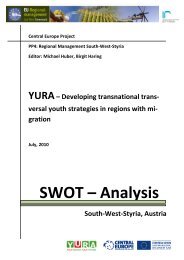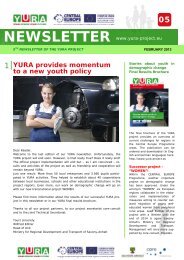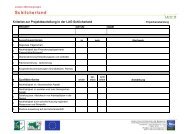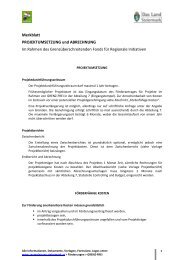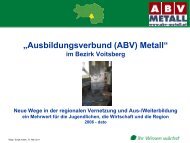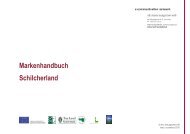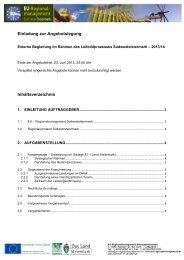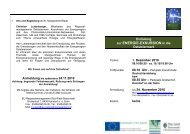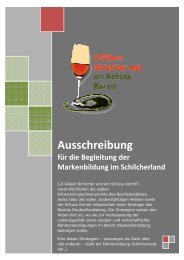regional strategy south-west-styria - EU-Regionalmanagement ...
regional strategy south-west-styria - EU-Regionalmanagement ...
regional strategy south-west-styria - EU-Regionalmanagement ...
You also want an ePaper? Increase the reach of your titles
YUMPU automatically turns print PDFs into web optimized ePapers that Google loves.
Mobility<br />
Mobility is a central issue for young people in the region South-West Styria.<br />
Municipalities face the challenge to create sustainable offers for people despite a decreased flow<br />
of funds and to promote the many positive aspects of rural life as well as to constantly adjust<br />
the offers to young people’s needs. In the course of the future laboratory it became clear that<br />
there is a wide range of leisure facilities offered in the single municipalities. In this area there<br />
will be special need for <strong>regional</strong> cooperation to reduce costs and share resources. This means<br />
that there is need for mobility opportunities in the evening and on weekends especially for<br />
younger people to be able to observe the offers. Very often, the missing of public transfer is<br />
substituted at home, which means that parents have to become their children’s taxi drivers.<br />
“Everything is scattered and spoilt. There is hardly anything in the near surrounding.”<br />
This shows that there is need for optimized and flexible offers to meet the young people’s<br />
needs, the need for public transport, however, changes with motorization (moped, car) from<br />
leisure facilities towards going out in the evenings. The most important issues for young people<br />
are improved (especially uniform) transport connections, flexible and affordable taxis, more<br />
public transport on weekends and especially in the evenings (concerts, going out, events,<br />
cinema) but also better connections to shopping centers.<br />
“Nobody knows when and where the busses are running and where they are going”.<br />
Most young people start to commute between home and work very early on. With the help of<br />
proper mobility opportunities it could be possible to keep young people who work outside of the<br />
region in their home region. The stronger the attachment to the region the more probable is it<br />
for young people to accept commuting if it is later necessary.<br />
With regard to the expansion of individual spheres of operation, the expansion of public<br />
transport also plays a crucial role. It would be rather important to establish a public transport<br />
system, which covers also peripheral rural regions and enables a consumer-orientated usage in<br />
order to reduce the dependency on costly and environmentally polluting private motorized<br />
transport (which is rather important for young people). Thus, young people could have easier<br />
access to local and <strong>regional</strong> offers and the exclusion of development- and participation<br />
possibilities could be avoided. (cf. Dax, 2002. p. 177)<br />
Young people living in rural areas have to be mobile. As they are to a great extent dependent<br />
on their parents and public transport, the purchase of a car or a moped happens rather early.<br />
This enhances independence and the social status. With respect to the difference between girls<br />
and boys it is a fact that girls still have less mobility opportunities than boys. The lack of<br />
particularly higher qualified and future-safe education-/ job-/ advanced training opportunities<br />
forces young people to commute and moreover contributes, especially in structurally weaker<br />
regions, to the migration pressure of younger qualified working people (especially young<br />
women)<br />
Prevention and Health<br />
Concerning prevention and health there will be no direct focus in our region. However, we will<br />
attempt to include preventive and mobile offers for young people more strongly in the region as<br />
they are an important support for young people, especially in a crisis situation.<br />
Page 35 / 53<br />
This project is implemented through the CENTRAL <strong>EU</strong>ROPE Programme co -financed by the ERDF



